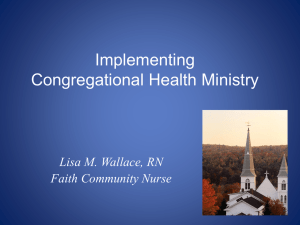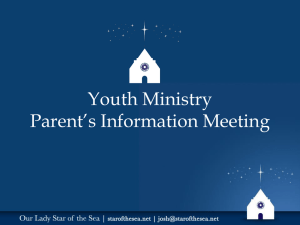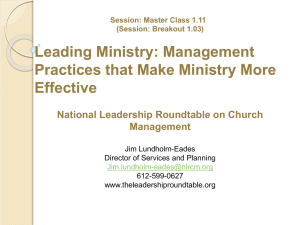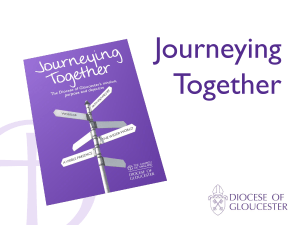Forming Parish Social Ministry Teams (PowerPoint)
advertisement
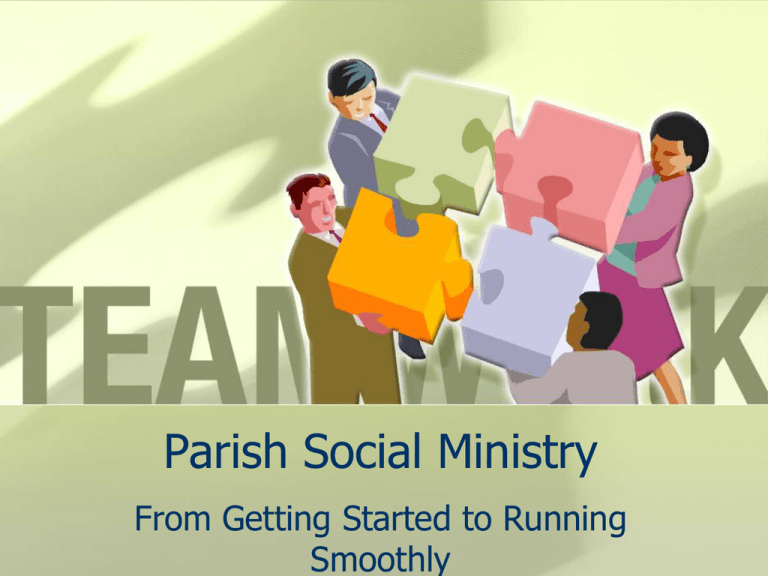
Parish Social Ministry From Getting Started to Running Smoothly Goals To provide the members St. Michael Parish – Waialua with the foundation for Parish Social Ministry and models of organizing social ministry in their parishes. To provide helps in developing, expanding parish social ministry in their parishes. To provide the opportunity for parish sharing What is Parish Social Ministry? Definition Parish social ministry is an organized effort of the entire parish to serve those in need, to advocate for justice and to work at changing societal structures that perpetuate injustices. Parish Social Ministry: Strategies for Success by Tom Ulrich Provides a complete definition: “In summary, the full mission of parish social ministry is to help parishioners understand and act on Catholic Social Teaching. It does that by organizing teams of leaders in (at least) four ministry areas of direct service, legislative advocacy, global solidarity/global justice and peace, and community organizing. Those leaders, in turn, invite and recruit the rest of the parish to participate. Finally, all the activity is reinforced through formation and education in Catholic Social Teaching.” What is Catholic Social Teaching? Simply put, the teachings of the Church known as Catholic Social Teaching, are a body of doctrine that the church has developed, with the Holy Spirit’s guidance, to apply the gospel of Jesus to our life together as members of one human family. It has three aspects: 1. It gives us principles for reflection 2. It provides criteria for judgment. 3. It gives guidelines for action. Pope Benedict XVI First encyclical in 2005, Deus Caritas Est (God is Love), Pope Benedict states that “social charity” is one of the three essential responsibilities of the Catholic Church Deus Caritas Est. “The Church’s deepest nature is expressed in her three-fold responsibility: of proclaiming the word of God, celebrating the sacraments, and exercising the ministry of charity. Theses duties presuppose each other and are inseparable. For the Church, charity is not a kind of welfare activity which could equally be left to others, but is a part of her nature, an indispensable expression of her very being…” Deus Caritas Est (continued) “The direct duty to work for a just ordering in society…is proper to the lay faithful. As citizens of the State, they are called to take part in public life in a personal capacity. So they cannot relinquish their participation “in the many different economic, social, legislative, administrative and cultural areas, which are intended to promote the … the common good.” Communities of Salt and Light: Reflections on the Social Mission of the Parish US Bishops’ 1994 Document emphasizes the critical need for parishes to be sources of Christ’s love in the world: “At a time when the rich are getting richer and the poor are getting poorer, we insist on the moral test of our society is how we treat and care for the weakest among us. In these challenging days, we believe that the Catholic community needs to be more than ever a source of clear moral vision and effective action…The pursuit of justice and peace is an essential part of what makes a parish Catholic.” A Responsibility for the ENTIRE Parish Community Again, as the US Bishops stated: “We need to build local communities of faith where our social teaching is central, not fringe; where social ministry is integral, not optional; where it is the work of every believer, not just the mission of a few committed people and committees. One Model, Not the Only Model There are many models that a parish can create to: Ensure that “organizing” and “doing” social ministry happens Ensure that our social mission is woven throughout parish life Ensure that social ministry includes a variety of opportunities for parishioners to act through service and through advocacy or working for justice and peace Experimentation is encouraged because the structure must meet the unique qualities and challenges of each parish Most important point is to make sure that a core group of people are specifically responsible for helping the parish act on each of the elements of effective parish social ministry. Social Ministry in a Parish Can take on a variety of forms and organization (structure) They are incredible signs of Christ alive in our world, working through the faithful to bring love to those who need it the most and to transform the world’s social structures to better reflect God’s Kingdom of peace and justice. Our Catholic doctrine insists that these tasks are constitutive (essential) dimensions of living out the Gospel and are necessary responsibilities of our parishes. The Two Feet of Christian Service Charity Justice Direct Service Social Change It takes two feet to walk. Otherwise we lose balance. If we use only the first foot (direct service), we can make matters worse by fostering dependency. If we use only the second foot (social change) we run the risk of becoming too far removed from the reality of the problem A true Christian faith requires both steps GlobalGlobal Solidarity Solidarity/Justice andLegislative Justice and and Peace Peace Education Advocacy Community Education Organizing Legislative Legislative Advocacy Advocacy Community Organizing Legislative Community Advocacy Organizing Community Organizing Direct Direct Services Direct Services or Outreach Direct Services Services/ Outreach Catholic Social Catholic Social Teaching Catholic Social Teaching Catholic Teaching FORMATI Social FORMATION Formation ON Teaching FORMATION FORMATION One Model, Not the Only Model The Coordination Team Direct Service and Outreach Global Solidarity Community Organizing Legislative Advocacy Parish Social Ministry Coordination Team Usually made up of leaders or representatives from each of the social ministry sub-areas They meet regularly (monthly) to keep ach other informed about parish social ministry activities. A chair person or co-chairpersons convenes and runs the meetings. Setting the Stage* S t y le s o f M in is t r y S o c ia l C h a n g e O r g a n iz in g A dvocacy The fo c u s is on th e p o w e r le s s r e p r e s e n t in g t h e m s e lv e s t h r o u g h c o m m u n it y o r g a n iz in g and d e v e lo p m e n t . T h is in v o lv e s le a d e r s h ip d e v e lo p m e n t am ong t h e g r a s s r o o t s , b u ild in g a b a s e o f power th ro u g h o n e -o n -o n e r e la t io n s h ip s and m a x im iz in g c it iz e n p a r t ic ip a t io n in th e d e c is io n s th a t a ffe c t p e o p le ’s liv e s . The s tra te g y o f a d v o c a c y fo c u s e s on th e p o w e rfu l s p e a k in g fo r th e p o w e r le s s . T h o s e w h o b e n e f it f r o m t h e e x is t in g s y s te m w o rk ve ry h a rd to r e f o r m , o r f ix t h e s y s t e m , b e lie v in g it s h o u ld b e n e f it e v e r y o n e f a ir ly . E lit e G ra s s R o o ts D e c is io n M a k in g C h a r it y a n d O u t r e a c h S o li d a r it y Program Goals The s tra te g y o f m a in t a in in g , e n a b lin g and s u p p o r t in g m in is t r y w it h p e o p le w h o a r e h u r t in g . P r o v id e s a s s is t a n c e t o o t h e r s t o c o p e in t im e s o f s o c ia l a n d e c o n o m ic c r is is . S o c ia l S ta b ilit y The id e a th a t hum ans a re r a d ic a lly in t e r d e p e n d e n t a n d t h a t th e c o n c e rn s of one p e rs o n or n a t io n a re th e c o n c e rn s of a ll p e o p le o r n a t io n s . S o lid a r it y c a lls a ll p e o p le t o o v e r c o m e b a r r ie r s o f ra c e , r e lig io n , e t h n ic it y , n a t io n a lit y , g e n d e r a n d e c o n o m ic p o s it io n . Communities of Salt and Light Basic Structure for Parish Teams Prayer and Worship Leader or Team IssueSpecific Teams Community Organizing Leader or Team Parish Social Ministry Coordination Team Global Solidarity and Peace Leader or Team Education and Formation Leader or Team Family, Work, Citizenship Leader or Team Charity and Outreach Leader or Team Advocacy Leader or Team How to organize a team of leaders? Step 1: Find 3-5 allies who want to start a ministry . Step 4: Clarify committee structure and purpose. Step 2: Meet and discuss what you want to do & why. Step 3: Organize and execute parish analysis . Step 5: Recruit and train people on CST. Step 6: Act from original plan and create evaluation process. The PSM Coordination Team Primary Oversight and Support Functions 1. Coordinating social ministry activities to ensure a smooth, well functioning operation. 2. Providing oversight of the integration of the parish social ministry effort into the overall life of the parish. 3. Providing oversight (and coordination) of the planning for t he different social ministry activities. 4. Developing an effective and comprehensive system of communication with special emphasis on communication with the pastor and pastoral council. 5. Identifying emerging parish and community social ministry needs and potential leaders. 6. Providing social ministry skills training opportunities for parishioners. 7. Maintaining communication with diocesan offices (OSM) that can deliver professional skills training and support for social ministry leaders. 8. Emphasizing the seven touchstones described in Communities of Salt and Light. Differences – Organizers and Doers WE NEED BOTH! Organizers tend to do the following activities: Planning Being strategic Recruiting leaders and participants Bringing people together Organizing training sessions on Catholic Social Teaching and social ministry skills Facilitating problem solving discussions and meetings Visioning Listening and communicating Doers of social ministry are busy with: Putting the solutions into action Being energetic and dedicated to completing tasks Learning ministry skills Deepening their baptismal call to serve through participation in on-going formation Providing input, ideas, data, that shapes the planning process “Doers” versus “Organizers or Leaders” As distinguished from the leaders of social ministry who are the “organizers” Make sure specific tasks get done Are the people who make the home visits to the elderly, who collect/distribute the food, write the letters to the legislators, attend the rally sponsored by a community organization, make a trip to with fellow parishioners to a homeless shelter. They do not organize the effort, they perform the service. Of course, organizers can be doers and vice versa. However, the critical thing is to know the difference and to make sure the parish has a structure or system that includes leaders or organizers, who make sure many parishioners have opportunities to become “doers.” Important Purpose for Meetings They provide a setting for creating and maintaining an effective system of communication about PSM activities, making sure that the various leaders and activities are not “bumping into each other” due to duplication, poor communication, unplanned recruitment, or other reasons. They ensure that each social ministry leader or team produces some type of annual plan so that the efforts are well thought out and the tasks identified can be accomplished. They provide opportunities to identify situations where two or more leaders or teams might work together. For example, the global solidarity leader and the legislative advocacy leader might work together to help the parish respond to a crisis somewhere in the world. Part of the response might involve a collection of money or goods. Another might involve lobbying on U.S. policy related to the crisis or related to poverty in the U.S. and abroad. They allow the leaders or teams that relate to other ministries in the parish (e.g., prayer/worship and education)/formation) to keep abreast of what other social ministry leaders are planning so they can identify opportunities to make connections among parish ministries. For example, the education/formation leader might learn from the advocacy leader about plans for a pro-life rally on island and might work with the DRE to arrange for Confirmation candidates to participate. They provide a forum for proposing and discussing major new social ministry initiatives in the parish. For example, they might provide a forum on faith-based organizing and what it means for the parish and community. They provide for accountability. If a leader or team doesn’t have anything to report, they may not be doing their job! A few more general concepts… Decide on a model that will work best for your parish Pull together a good team…no lone rangers…even Lone Ranger had Tonto Create vision, mission, objectives/action plans and goals Official connection to pastoral council Intentional communication with other appropriate parish ministries Pastor and staff support – A Must! CCHD, CRS, Catholic Charities, Respect Life are social justice connections that are important to recognize. Key Elements for Success Not “my” ministry. It is “our” parish’s ministry. Focused, and addresses the full mission of social ministry. Thought and planning goes into organizing and developing leadership teams. PSM efforts are known, integrated into, and supported by the ENTIRE parish. Explore the deeper social, political, and institutional causes of problems and issues being addressed by the parish. Be an active part of the Diocesan social ministry network. Dedicated and committed leaders…not wearing too many hats. Have Fun! No one wants a grim and grumpy dogooder OSM is only a phone call away – reinforcements on the way Questions, comments…


